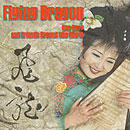
Gao Hong, a virtuoso pipa player, presents a series of cross-cultural pieces on Flying Dragon, blending traditional Chinese music with Indian, Japanese and American jazz. Gao is less of an intrepid experimentalist than either Min-Xiao Fen or Wu Man, preferring to integrate aspects of each tradition into a solid weave rather than to stretch the forms. This sort of melding can easily lead to unfocused, new-agey meandering but that�s usually avoided here.
The first track, �Morning,� is actually nothing short of spectacular, a trio of Gao, sitarist Shubhendra Rao and tabla player Ty Burhoe. It�s in North Indian raga form and Gao �simply� (her playing is by no means simple) fits in perfectly, her pipa taking the role of second sitar, giving as good as she gets as the tempo mounts into an ecstatic fury. It�s arguably worth the price of the disc on its own. �Moved By the Spirit� finds Gao in duo with flutist James Newton, himself well known for collaborations with many musicians outside of the jazz field. It�s an improvisation, loosely based on a Chinese folk theme at the beginning, with Newton playing slow, haunting lines, but it escalates into something of a whirlwind, Gao improvising freely, Newton blowing overtones with abandon. There�s some nice interplay, but also a formlessness that robs the work of any cumulative power. The title cut is a solo, a pensive and rather lovely evocation of Gao�s geographical and emotional journey from one side of the world to another. Here, the structure, first melancholy then triumphant, achieves a fine balance lacking in the preceding piece.
�Cutting Grain Song� finds her with shakuhachi master Yoshio Kurahashi, performing a traditional Japanese tune. Again, a beautiful number, though here Kurahashi is predominant, leaving Gao in an entirely supporting role, her koto-inspired playing adding little. The disc closes with �Silk Road,� a Gao composition in which everyone on the prior cuts joins in. This is where the Benetton-like mushiness, the �We Are the World� aspect this listener was cautious about from the beginning but which had been so far largely avoided sets in. It�s something of a mish-mash, each musician contributing attractive enough lines but the strands never merging into a whole that really justifies the mix. If one isolates the playing of the trio from the first track, there�s some fine work; would that they had simply chosen to include another piece from that configuration.
Flying Dragon is a generally enjoyable disc with some real high points. Anyone unfamiliar with the joys of the pipa could do worse than to start here but might, from this point, seek both to search back into its tradition and forward into the work of several contemporary improvising players.
Comments and Feedback:



More Recent Reviews, Articles, and Interviews @ The Squid's Ear...


|

